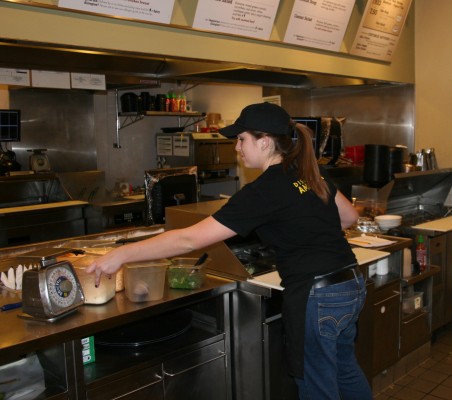During the school year, students manage homework, extracurricular activities, and time with their family and friends. Some like Jordan Manno, senior, also have a job.
Manno works between 22 and 25 hours a week at Villa Farotto restaurant while participating in show choir and maintaining her grades. However, she leaves school halfway through the day as a part of the CCE program, otherwise known as the Business Internship program.
Students in CCE enroll in a minimum of four classes, one of which is the CCE class. The CCE curriculum is a program where students earn credit by working at a paid internship. It’s available to seniors who are in good academic, discipline and attendance standing, Mary Haar, CCE teacher, said.
“The CCE student schedule will vary to meet individual employment and academic needs,” Haar said. “Students have the flexibility to work during the school day, evenings or weekends in order to earn credit for employment.”
Not all students are able to leave school to work though.
Amy Husenica, sophomore, who is ineligible for CCE due to her age, must go to school for a full day every day and works approximately 25 hours a week at Noodles & Co.
“I work mostly weekends and nights, so I can’t go to football games or parties,” Husenica said.
Husenica said balancing work and school is difficult because she gets home late from work after school and then has to do homework, leaving her tired the next day.
Don Coons, guidance counselor, said a lot of students do very well making time for schoolwork and their job, but on the other side, having a job takes a lot of time and some students struggle with it. Coons said the big key is understanding that school should be a student’s job before anything else.
“The hardest part is prioritizing their time,” Coons said.
Manno said that before she participated in CCE, she said she struggled more with balancing her time. She previously performed in MHS theatre productions where she was required to stay after school many hours for dress rehearsals.
Manno said her previous employers didn’t understand that, and would not let her off work, which was very stressful.
“Ideally, if a student doesn’t have to work, they should use their four years of high school to enjoy their time here,” Coons said. “Studies show students involved in school-related activities are more successful in the classroom.”
It’s different if a student must work because a family situation because then students are taking on a very adult responsibility, he said.
While Haar said a student’s job usually should not take up more than 20 hours a week, she said jobs can be very beneficial for students.
“Part-time jobs give students a feeling of independence and help students pay for miscellaneous expenses such as cell phones, gas, car insurance, savings for college, and extracurricular activities,” Haar said. “By working, students are able to learn responsibility, accountability and time management.”
Manno works to earn money to put toward college. She said having a job in high school is worth the time because it teaches responsibility and forces students to balance work and school, as well as extracurricular activities.
“It’s best to learn how to balance it all now so it’s easier later on,” Manno said.
Husenica said she uses her nights off to study, and does a lot of her homework on the weekends. She encouraged working students to make the best use of their time off work.
“School should be a student’s number one priority,” Haar said. “Students will want to find an employer who can give them the flexibility needed to accommodate their school schedule.”




